In an attempt to better document the American underground press, or at least the sharp, tiny sliver of it that I find most interesting, I’ve given myself the task of reaching out to all of those former and current zine publishers that I know, and asking them about their motivations and experiences. Today’s interview is with the man behind 8-Track Mind, Russ Forster.
MARK: Was 8-Track Mind the first thing you ever printed and distributed?
RUSS: Not quite. In 1985 I circulated a free 2-page zine called Positive Force that pushed some naive but sincere lefty-political-punk sentiments. It only lasted one issue, probably because it wasn’t a whole lot of fun to read.
MARK: Can you give me an example of what made it un-fun to read?
RUSS: Über-progressive politics can be dreadfully dull, especially when it leans toward the naïve. It becomes preachiness without the soul. Kinda like Tea Party politics these days.
MARK: How old were you when you started 8-Track Mind and what was your situation at the time?
RUSS: The first 8-TM that my 8-track enthusiast (or “tracker”) friends and I worked on came out in 1990, when I was 27. That first issue was #69, as we were told that there were 68 issues published in the 1970s and early 1980s by an unbalanced gentleman by the name of Gordon Van Gelder. I got interested while on tour with End Result in 1989, after running into fellow “trackers” in Boston and New York, and saw the magazine as a way to bring 8-track enthusiasts together across the country. The first issue “sold out” of its initial run of 100 within a month, and was reprinted several times to meet the unexpected demand. I moved to Detroit soon afterward, but decided to continue to publish 8-TM from that unlikely location and did so for the next 9 years.
MARK: What else can you tell us about Gordon Van Gelder…
RUSS: We came to believe that he was a master manipulator who used a bogus story about the “pre-history” of 8-TM to become a contributor to our version. No one has ever seen any 8-TM issue before #69, and some people have looked pretty hard for one.
MARK: That’s one thing that Crimewave lacked… a good origin myth. From now on, when people ask, I’m going to say that an angel led me to the first issue, which was etched in gold tablets, inside a buried stone box… Not that I don’t believe you about Van Gelder… I’m just going off on a completely unrelated tangent.
RUSS: Oh, ye of little faith… You can read his entertaining blathering in issues #69-73 if you don’t believe in his existence.
MARK: You mention that your first issue of 8-TM (#69) sold out in a month, which leads me to believe that sales weren’t generated, at least at first, by reviews in publications like Factsheet Five. I’m curious as to how, at the beginning, you were selling them. Were you touring with them, and selling them at shows, or did you, from the very start, have them in record stores and the like?
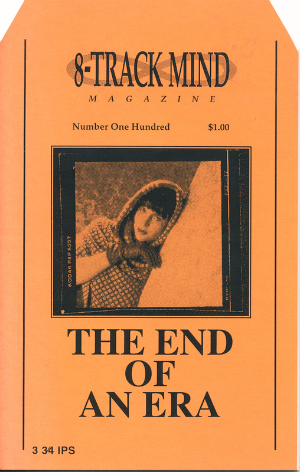 RUSS: Contributors worked to distribute magazines as well. That first issue ended up in bookstores, like the one at the Museum Of Contemporary Art in Chicago, and some more discerning record stores (especially ones that were still selling 8-tracks, like Records Records Records in Villa Park, Illinois). Probably most copies were giveaways, truth be told, but we weren’t that worried about money at the beginning. Eventually it did make its way to Factsheet Five, where 8-TM was always given positive reviews (and it was often the first zine listed alphabetically, which doesn’t hurt!).
RUSS: Contributors worked to distribute magazines as well. That first issue ended up in bookstores, like the one at the Museum Of Contemporary Art in Chicago, and some more discerning record stores (especially ones that were still selling 8-tracks, like Records Records Records in Villa Park, Illinois). Probably most copies were giveaways, truth be told, but we weren’t that worried about money at the beginning. Eventually it did make its way to Factsheet Five, where 8-TM was always given positive reviews (and it was often the first zine listed alphabetically, which doesn’t hurt!).
MARK: By “End Result,” I’m assuming you mean the Chicago punk band, right? When you say that you toured with them, do you mean that you were playing in the band, or were you in another band that happened to be traveling with them?
RUSS: I was a member of End Result off and on from 1986 to 1989. I’m not that fond of the recordings I made with the band during that time, but I remember the live shows being pretty compelling.
MARK: Granted, I didn’t know you as a young man, but you don’t exactly exude what I’d call “punk rock energy.”
RUSS: I’m not sure End Result was a “punk rock” band. I’m not sure any band I’ve ever been in would be considered “punk rock.” I’m more the “art-damaged pop” kinda guy. And my hands have bled a lot after beating stringed instruments to within an inch of their lives onstage.
MARK: When I see you, you must always be in Energy Conservation Mode…
RUSS: I’d probably just driven 8 hours or the like after trying to catch some quick sleep in my van. And Ypsilanti always had a soporific effect on me.
MARK: For the younger folks in the audience, maybe we should begin with a definition… What’s an 8-track?
RUSS: 8-track tapes and players (not to be confused with 8-track sound recording equipment) were invented for use in Lear Jets in the mid-1960s, but found their greatest popularity as the first pre-recorded sound format available in automobiles. 8-track cartridges were about twice the size as compact cassettes, and were designed to hold an “infinite loop” of 1/4″ audio tape with the tail of the tape attached to the head by a tape splice. They were complicated and prone to failure, and became a symbol of the more laughable aspects of ’70s culture.
MARK: And what was it, or what is it, that you found so compelling about 8-tracks?
RUSS: I personally loved the “ugly duckling” aspect. In the mid-to-late 1980s 8-tracks were ubiquitous and plentiful in thrift stores, allowing me to build a huge collection of great tapes for less than the price of a CD player and a couple of CDs. I also loved poking the purveyors of music technology in the eye by eschewing their barely veiled attempts at making people re-buy their music collections on a “new, improved” format to boost corporate profits. It was also nice to recycle tapes and players rather than send them to the landfill.
MARK: Does the fascination continue, or are there new obsessions?
RUSS: I still have a collection of over 2000 tapes and about a dozen players. I’m not interested in acquiring any more, though. My current obsessions are exercise VHS tapes and lousy pop LPs.
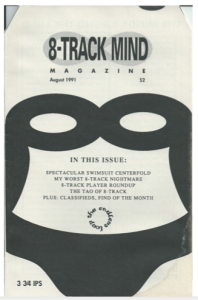 MARK: What was childhood like for Russ Forster?
MARK: What was childhood like for Russ Forster?
RUSS: Broken home, broken heart — the usual white privileged suburban experience.
MARK: But it wasn’t all bad… As I recall, you spent several weeks each year with your grandmother at Disney World, even well into your adult years, right? Or at least I remember getting postcards from you… “Rubbing Grandma’s feet after another long day in the Magic Kingdom.”
RUSS: That was a truly difficult and disgusting time, orchestrated by my mother. I think my grandmother had a good time, but three weeks on Disney property left me scarred for life.
MARK: What was your mother trying to accomplish by sending you and your grandmother away?
RUSS: Pure escapist bliss? It was a way of denying the State Of Illinois money that would have gone to the nursing home instead. Better in Disney’s cold, corporate hands, I suppose…
MARK: Have you ever talked with your mother about this? I’m getting the sense that there may be some unresolved issues.
RUSS: I’m fine with un-resolution.
MARK: What did your parents do for a living?
RUSS: Dad: Educational Computer Software Production, Gresham, Oregon; Mom: Professor of Sociology at Elmhurst College, Elmhurst, Illinois.
MARK: So, you grew up in the suburbs of Chicago?
RUSS: Elmhurst, Illinois, about 30 miles due west of Chicago. Land of “broad lawns and narrow minds” to quote Hemingway (who actually grew up in Oak Park, Illinois).
MARK: What kind of kid were you?
RUSS: Precocious and painfully shy.
MARK: Were there warning signs early on that you might pursue a life in the underground press?
RUSS: I wanted to be a hippie at age 10, and started reading Rolling Stone and other music mags religiously. Creative control was always key to me, and the underground was the only place that seemed to offer it.
MARK: Do you remember your first brush with real counter culture… something a little harder than Rolling Stone?
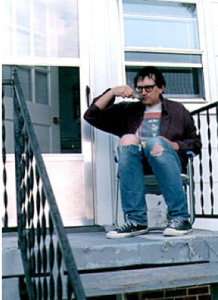 RUSS: Is Creem magazine hard enough? It kinda freaked me out.
RUSS: Is Creem magazine hard enough? It kinda freaked me out.
MARK: What freaked you about Creem?
RUSS: That extreme, irreverent Detroit sensibility that’s become all the rage in years hence.
MARK: Do you remember the first zine you’d seen?
RUSS: Nope. It was probably something handed to me at a hardcore punk show in Chicago circa 1983 or so.
MARK: My memory is notoriously bad, but I believe we first met in Atlanta. It would have probably been around 1995, and you were traveling around the U.S. on some kind of 8-Track Mind tour. I believe you were living in Chicago at the time, and making your living as a mover and hanger of art. Is that right?
RUSS: It was probably 1996. I was back and forth between Detroit and Chicago and homelessness, and I don’t think I made much of a living. I did get some work as an art handler/installer for a bit somewhere in there.
MARK: When you say homeless, do you mean crashing on the couches of friends, or literally living on the street?
RUSS: Living in my van, mostly on the west coast somewhere.
MARK: Do you look back at that time in your life fondly?
RUSS: It was hell with glimpses of heaven. And a whole lot of celibacy.
MARK: On that tour which brought you through Atlanta, I remember that you sang and played guitar. I don’t remember the content of the songs, though. Were they about 8-tracks?
RUSS: I wrote a song in 1995 called “8-Track Love” which I still perform on occasion as my extreme-solo act Rakehell. It’s featured on the debut Rakehell LP, Pure Pop Poison, which is available on vinyl only.
MARK: What makes an act “extreme solo” as opposed to just “solo”?
RUSS: Sounds much more exciting, doesn’t it? “Solo” could connote me at the forefront of a group of musicians; “extreme solo” is me alone with a bunch of broken down equipment making noise somewhat reminiscent of pop music.
MARK: What are the lyrics of “8-Track Love”?
RUSS: Something about Heaven 17 tapes and making babies while listening to Barry White on 8-track. “8-track love/with 8 different people/in 8 different places/with 8-tracks playing the whole time.” Vaguely erotic, with a geek edge.
MARK: Have you made babies? And, if so, what was that experience like?
RUSS: By “babies” if you mean records, then the answer is “yes,” and it’s excruciatingly painful and emotionally traumatizing. If you mean humans, the answer is, “almost but not quite.” It was bad timing in both cases.
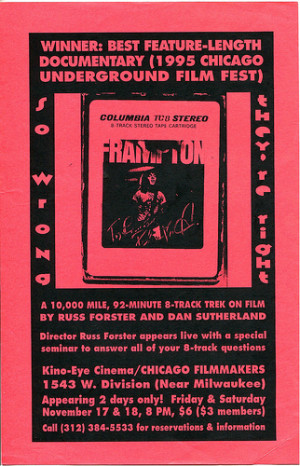 MARK: At some point in the evolution of 8-Track Mind, you made a film called So Wrong They’re Right, about 8-track collectors. At what point did you know that you wanted to make a film?
MARK: At some point in the evolution of 8-Track Mind, you made a film called So Wrong They’re Right, about 8-track collectors. At what point did you know that you wanted to make a film?
RUSS: In 1993 I was finding my P.O. box constantly filled with fan mail and unsolicited submissions to the magazine, and the demand for 8-TM was increasing amazingly across the country. By this time I’d already made two short films and was trying to come up with a concept for a third. I decided that I could make a documentary like I edited the magazine, as a collaborative effort with other enthusiasts, and when I floated the idea to the 8-TM community the response was overwhelmingly positive.
MARK: I think I feel a long-buried memory concerning your earlier film work coming to the surface… I don’t know how to say this… Did it involve you performing an act that most people probably wouldn’t commit to film?
RUSS: Masturbation and ritual castration was part of the G-Rated Porn world I documented with my first two films.
MARK: Seems like a natural progression from ritual castration to 8-track collecting… Are you working on any film projects at present?
RUSS: I’m putting together a series of impossible exercise videos, two of which are available on my YouTube channel.
MARK: Can you give me an example of an impossible exercise?
RUSS: Any aerobics done to the beat of speed metal is a pretty likely foray into the impossible.
MARK: You recently brought 8-Track Mind back to life. How’s it different now than it was at the beginning?
RUSS: There’s much less emphasis on 8-tracks per se (partially because they’ve become so hard to find these days) and more on the philosophical themes of the “old” 8-TM like anti-corporate-consumerism and love of analog technologies. The voices have changed but the ideas haven’t.
MARK: Do you keep in touch with any of your old tracker friends? It’s been 15 years since I watched the movie, but I’m curious what happened to the folks you interviewed… like that girl.
RUSS: Ah, short eyes have you? Christine Williams was only 14 when she submitted her first piece to the magazine, and was 17 in the film. I think she thought some wild filmmakers would take her away from her North Carolina hell, but her sex kitten moves only made us nervous. When I talked about visiting her a few years later with Malcolm Riviera as chaperone, she refused, and then repudiated all ties with the magazine and film. I heard she did take some LSD along the way somewhere, and that seemed somehow hopeful to me… Issue #103 (Summer 2015) will give the full So Wrong They’re Right update, 20 years after the film’s release. Then I think I’m done.
MARK: How did the idea come about to start clipping the corners from 8-Track Mind, so that the magazine resembled an 8-track tape?
RUSS: I’ve always liked the idea of personalizing product, so the idea of changing the shape of the magazine by hand has always excited me. I’m not sure who suggested making the magazine mimic the shape of an 8-track tape, but it was a stroke of brilliance.
MARK: What’s the best thing to come from 8-Track Mind?
RUSS: The friendships, the philosophy, the cognitive dissonance. It was a wonderful, fun bit of performance art that grew into something much more deep and meaningful. And it has helped preserve and demystify a bit of American history.
MARK: What was the most intriguing thing you discovered in your quest to demystify 8-tracks?
RUSS: That 8-track was originally conceived of as an audiophile format for fat cats with Lear Jets, and that 8-tracks were produced commercially in some form until 1987 (giving them an over 20 year run).
MARK: What was the last 8-track ever mass produced?
RUSS: There is much debate, but most enthusiasts have concurred on Chicago 18 in 1987.
MARK: What was the first?
RUSS: Probably some classical tape for the Lear Jet set. RCA Records was the first to embrace the format. My oldest tape is The Sound Of Music soundtrack.
MARK: Are you aware of any bands still releasing stuff on homemade 8-tracks? That was a thing for a while, right?
RUSS: Cheap Trick put out their last record The Latest on 8-track in 2009. A beautiful piece, but it’ll run you $30.
MARK: So, what’s Russ Forster up to these days, when he’s not publishing the new 8-TM?
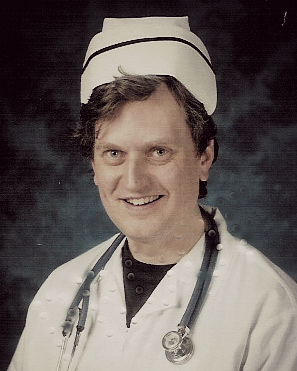 RUSS: Helping people pass to the next plane of existence as a hospice nurse.
RUSS: Helping people pass to the next plane of existence as a hospice nurse.
MARK: So, do you have any deep insights that you’d like to share with us, having been with a number of people as they pass on?
RUSS: The worst kind of devil is the one inside your head. Free your mind and your spirit will follow.
MARK: What do people generally talk about at the end, if they’re still capable of talking? Are there common regrets that are expressed?
RUSS: There’s often very little talk at the end, but a lot of listening. The brain keeps chugging even after the energy to speak and respond is gone, and hearing and touch are senses that seem to continue on pretty much to the end. Families and friends generally do much more regretting and fretting, but when that turns to remembering the healing begins.
MARK: How, if at all, has that line of work changed you?
RUSS: It’s made me appreciate a life well-lived, filled with joy and love… Oops, that’s a line from Love Story, isn’t it?
MARK: Just curious as to how this change has manifested itself in your life. What are you doing differently?
RUSS: I’ve learned to celebrate when a passing brings families and friends together instead of tearing them apart. I can see how that works now better than ever.
MARK: Any regrets? …If you could go back in time and pass along one bit of advice, especially as it related to 8-TM, what would it be?
RUSS: Not many regrets. It was a great adventure, even when it was incredibly tough and seemingly unrewarding. All it took was a lot of elbow grease and no small amount of naïveté, mixed with a decent sense of humor. Maybe a bit of cash too… Embrace adventure at least once in your life, kids!
MARK: Assuming people want to check out the film, or back issues of 8-TM, is there a way they can contact you?
RUSS: Oh boy, I still don’t have a website after all these years. Being a cyber-luddite doesn’t pay in some ways. But the 8-Track Heaven site run by my good friend and confidant Malcolm Riviera is still alive and kicking, and I have a Facebook page with some cryptic information on it.
MARK: What was the most surreal thing to happen in connection with 8-TM?
RUSS: Finishing the film and then having a “film industry” guy tell me it was the best thing he’d seen that month. But then he added that he didn’t see any money in it, which may have seemed harsh at the time, but was absolutely true.
MARK: Where did your “8 Noble Truths” come from? And why are there 9 of them?
RUSS: Ah grasshopper, the question is itself the answer.
MARK: If you could have just 1 Noble Truth, what would it be?
RUSS: Impermanence is eternal.
MARK: When you were in Chicago, you were friendly with a woman named Cynthia Plaster Caster, who’s famous, among other things, for having documented in plaster the penises of a generation of male rock stars. I’ve never seen it, but it was once whispered in my ear, at a party that both you and she were at, that a cast exists of your penis and that it looks like a twisted, tentacle-covered tree trunk… something out of a horror film. Do you care to comment?
RUSS: The casts look like friendly, funny mushrooms. Could be the smallest in her collection!
UPDATE: Here, for those of you sorry sons-of-bitches who have never seen a copy of 8-Track Mind, is a bit of detail from an issue published in 1991. The full, two-page layout can be found here.
[If you like what you’ve read and want more, be sure to check the other interviews in the History of Zines series.]


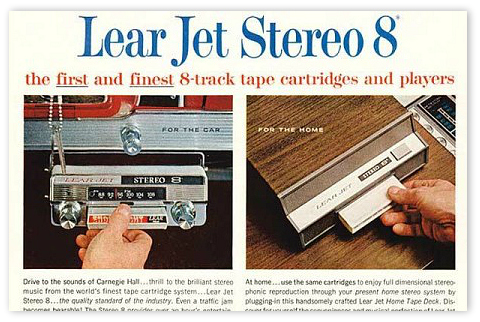
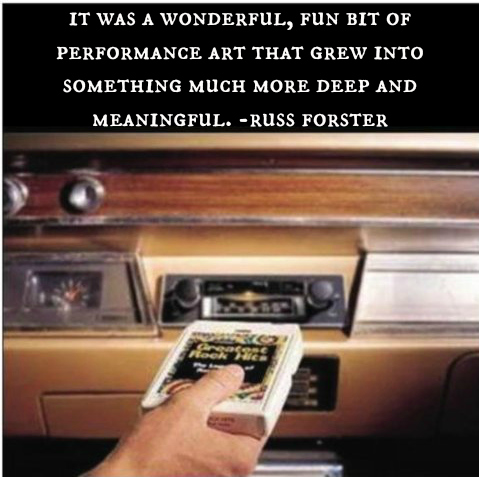
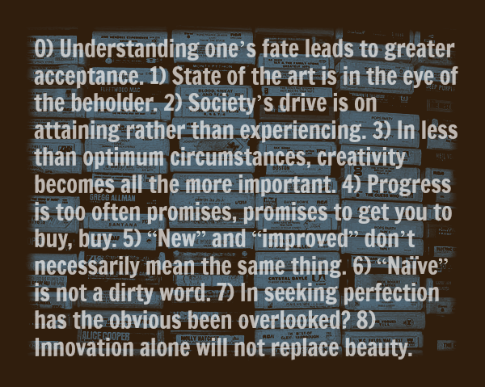
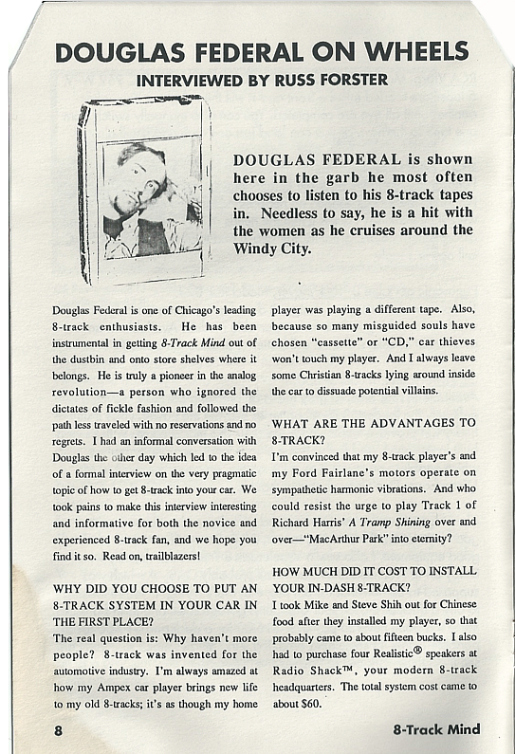







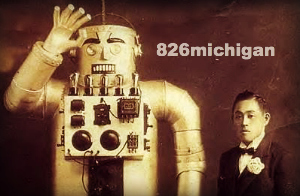



7 Comments
I’ve heard of Russ Forster.
If I were Russ, I’d take that as a compliment, Peter.
I loved 8-Track Mind. 8-tracks weren’t my thing, but I loved how passionate people were, the way the community came together over time, and the different tangents they’d explore together. It was inspiring.
In case you open it up to an art competition, here’s my submission.
http://imgur.com/IzvqmbR
It may not be up there with his approval but you can watch So Wrong They’re Right in its entirety on Youtube.
http://www.youtube.com/watch?v=B7nva7meVv0
I found something interesting while rewatching the film.
http://imgur.com/Cn5jGhZ
There is a Gordon Van Gelder. He is a science fiction editor. But he was born in ’66.
http://www.sfsite.com/08b/gvg87.htm
Russ Forster’s song “8-Track Love” can now be heard here:
http://www.reverbnation.com/rakehell/song/20567573-8-track-love
5 Trackbacks
[…] Goad, Dishwasher Pete, Bob Helms, Moe Bowstern, Al Hoff, Jen Angel and countless others. I even met Russ Forster in Chicago, although he probably doesn’t remember me. I met you and Linette in Ypsi, and I […]
[…] > Check out Mark Maynard’s recent interview with Russ Forster about 8-tracks. […]
[…] himself has made something of an analog comeback, at least according to this […]
[…] and magazines, including Factsheet 5, Murder Can be Fun, King Cat, ReSearch books, Dirty Plotte, 8-Track Mind, etc… We were big Factsheet 5 fans. I started collecting Michigan zines for a one-day […]
[…] ’94, I had Rudy Ray Moore’s phone number. I want to say that I got it from my friend Russ Forster, but I’m not 100% sure. What I am certain of, though, is that, for quite a few years, I […]